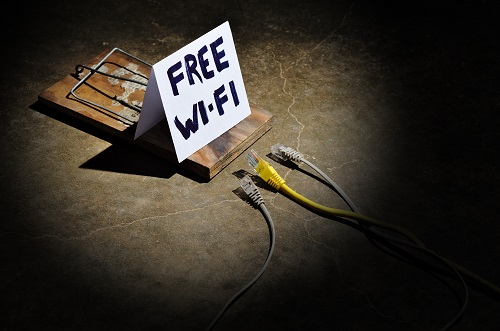With so many people needing internet access today, there are plenty of businesses that are willing to offer public Wi-Fi in exchange for a bit of your time (and money). Millions of people use these networks every day, and while the vast majority of those connections don’t lead to any negative consequences, most of them are far from secure. How do you avoid becoming one of the unlucky ones – a victim of public Wi-Fi data theft? Here are a few questions to ask:
- Who is giving away free internet, and what do they want in exchange? There are plenty of valid reasons for people to give away internet access. Coffee shops want you to hang around and buy coffee. Cellular providers set up access points for their customers in restaurants and other businesses as a perk for people signing up for their phone service. Chapel Hill even offers public Wi-Fi to encourage people to come downtown and shop.
Others have less noble intentions – if you are required to provide an email to log into the wireless network, there’s a good chance you opted into marketing messaging in the fine print of the login page. And if you can’t find a wireless network being advertised anywhere, and it doesn’t require a password, be extra cautious logging into that network. Conmen do set up wireless networks so they can grab all of the data being sent across the network, hoping to catch some valuable data like credit cards they can sell on the black market.

- Is my data being submitted securely? Even if you’re on a network secured by a password, the person providing the Wi-Fi access can still see the data being transmitted between your computer and sites you’re visiting. Data can also be seen by “sniffers” – people who have set up software that can “sniff” for Wi-Fi data signals and listen in on the requests and data being sent back.
To avoid this, make sure that all of your important requests are done securely. If you’re doing business work, the best way to do this is a Virtual Private Network – a secured connection to a computer inside your corporate network. If you’re visiting websites, make sure the sites start with https, not http. The s stands for ‘secure’ and it ensures that your data is encrypted. Always make sure you send credit card information over a secure connection, even if you aren’t on public Wi-Fi!
- Is my antivirus up-to-date? If you’re on public Wi-Fi, you’re sharing a network with anyone who wants to join in on the fun. If you regularly use public Wi-Fi, there’s a good chance your device is frequently in coughing distance from all sorts of viruses and malware being unknowingly carried around by laptops and other devices. If the coffee shop has professionally designed network infrastructure, it probably won’t hop over to your device. Do you think your coffee shop has professionally designed network infrastructure? If you’re not inside the Ritz-Carlton, I wouldn’t bet on it. Don’t use public Wi-Fi without up-to-date Anti-Virus software, or you might discover just how inconvienent public Wi-Fi can be.
To learn more about how we can keep computers on your business network secure, call us at 919.779.0954 or email mailto:Team_WingSwept@WingSwept.com
